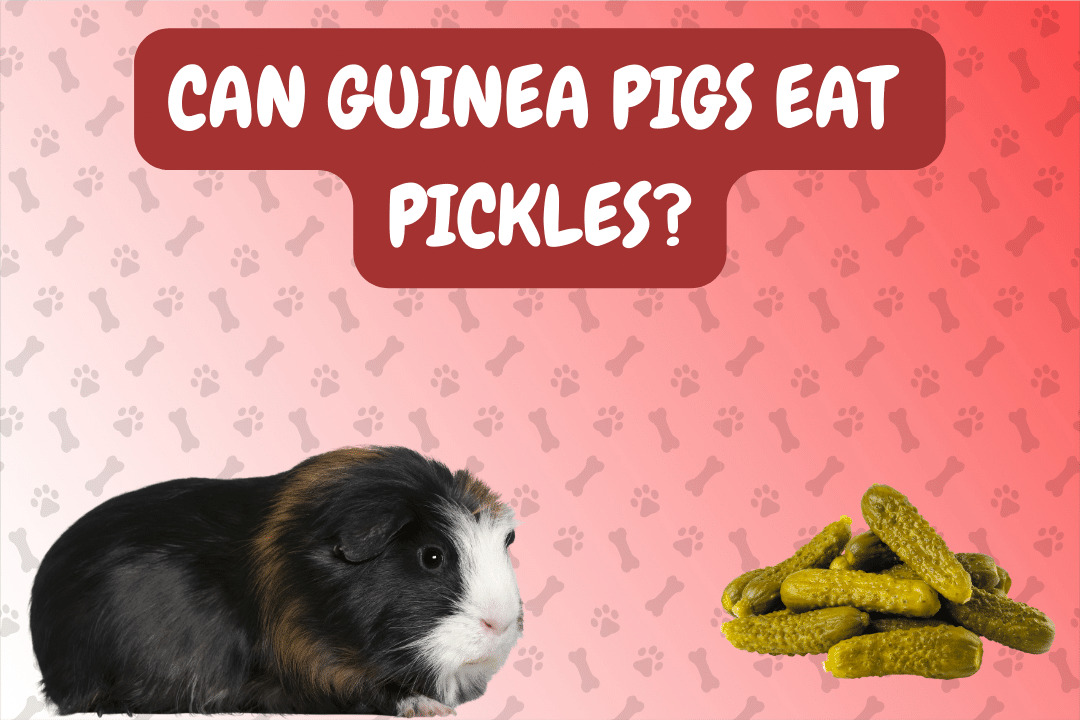No, guinea pigs can’t eat pickles because they are not suitable for their delicate digestive systems and can be harmful to their health.
Table of Contents
Introduction
Guinea pigs, those lovable and gentle creatures, bring joy to many homes. As a responsible guinea pig owner, it’s essential to ensure their diet is safe and appropriate. One common question that arises is whether can guinea pigs eat pickles? In this article, we will delve into the reasons why pickles are not a suitable choice for guinea pigs and the potential risks they pose.
Nutritional Value
Pickles, a popular human snack, are cucumbers soaked in a brine solution comprising vinegar, salt, and seasonings. While we humans might enjoy their tangy crunch, guinea pigs have distinct dietary needs. Their primary diet consists of fresh hay, fresh vegetables, and a small portion of high-quality guinea pig pellets. Unfortunately, pickles don’t provide the essential nutrients required by guinea pigs and, due to their high salt content, can be harmful to them.
Potential Risks
Feeding pickles to guinea pigs can present several potential risks. The high salt content in pickles can lead to health problems. Excessive salt consumption can result in dehydration, kidney issues, and digestive disturbances. Guinea pigs have sensitive digestive systems, and introducing salty and acidic foods like pickles can cause stomach upset and discomfort.
How to Serve Safely
To safeguard your guinea pig’s well-being, it’s best to completely avoid offering pickles. Their nutritional needs are best met through a balanced diet comprising fresh vegetables, hay, and the right kind of pellets. These foods provide the necessary vitamins and minerals without the health risks associated with pickles.
Serving Suggestions
Guinea pigs adore a variety of fresh vegetables as part of their diet. Instead of pickles, you can introduce them to small portions of suitable vegetables. It’s important to introduce new foods gradually to prevent digestive issues. Guinea pigs thrive on a diet that includes hay, fresh vegetables, and the appropriate pellets to maintain their health and happiness.
Special Considerations
Each guinea pig is unique, and some may have dietary sensitivities or allergies. Always keep an eye on your guinea pig’s response when introducing new foods. If you observe any adverse reactions, consult with a veterinarian to determine the best diet for your specific pet.
Expert Opinion
The consensus among veterinarians and guinea pig experts is clear: pickles should not be included in a guinea pig’s diet. The risks posed by the high salt content far outweigh any potential benefits, making pickles an unsuitable food choice for these delicate creatures.
Conclusion
In conclusion, guinea pigs should not eat pickles due to the potential risks associated with their high salt content. To keep your guinea pig happy and healthy, focus on providing them with a diet that aligns with their nutritional needs, including fresh hay, vegetables, and the right type of pellets. Avoid offering them human foods like pickles to ensure their well-being.
FAQ
1. Can guinea pigs have a small piece of pickle as an occasional treat?
No, even a small piece of pickle is not recommended for guinea pigs. It’s best to stick to foods that are safe and appropriate for their dietary requirements.
2. Are there types of pickles that are safer for guinea pigs?
No, all types of pickles, whether sweet or dill, are not suitable for guinea pigs due to their high salt content.
3. What are the potential health problems that guinea pigs can develop from eating pickles?
Guinea pigs can develop health issues such as dehydration, kidney problems, and digestive disturbances due to the high salt content in pickles.
4. Can guinea pigs tolerate any other types of human foods?
Guinea pigs can enjoy small portions of fresh vegetables, such as bell peppers, carrots, and leafy greens, as part of their diet. These provide essential nutrients without the risks associated with pickles.
5. How can I determine if my guinea pig has eaten pickles and is experiencing health issues?
If you suspect that your guinea pig has consumed pickles and is displaying signs of discomfort or digestive problems, contact your veterinarian immediately for guidance on ensuring your guinea pig’s safety and well-being.
6. Can guinea pigs eat other salty foods?
It’s best to avoid offering any salty foods to guinea pigs, as their sensitive digestive systems are not equipped to handle excess salt. Stick to their natural diet of fresh hay and vegetables for a healthy and happy pet.
7. Are there any exceptions for certain guinea pigs to eat pickles?
No, there are no exceptions. Pickles should be avoided for all guinea pigs due to their high salt content, which can lead to health issues.
8. Can I provide pickles as a rare treat for my guinea pig?
No, it’s not recommended to offer pickles as a treat for guinea pigs. There are safer and more suitable treats available for your furry friend.
9. Can guinea pigs eat pickles without the seeds?
No, even pickles without seeds are not suitable for guinea pigs due to their high salt content, which can be harmful to their health.
10. Can guinea pigs eat other types of pickled vegetables?
It’s best to avoid offering any pickled vegetables to guinea pigs. Stick to fresh, non-pickled vegetables as part of their diet to maintain their well-being.
For more Guinea Pigs food informations, keep reading our articles.
Hello! I’m Max Walley, a pet enthusiast who knows a lot about what our animal buddies can munch on and what’s a no-no. With ‘canpeteat.it,’ I’m here to help pet owners make smart food choices. Come with me as we dive into the world of pet nutrition, discovering what keeps our furry pals joyful and in tip-top shape. Let’s explore this adventure together!


